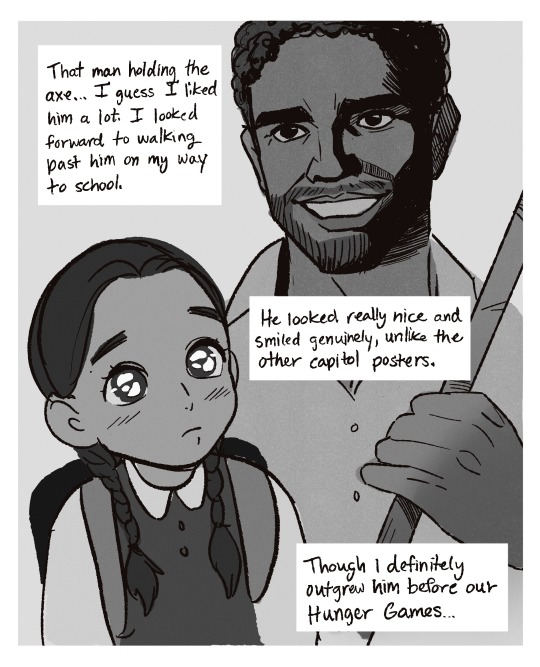haunted-armour-shell
21K posts
in this world I am aroace. in another I am a praying mantis knight deeply in love with my extremely magically powerful wife
Don't wanna be here? Send us removal request.
Text
Thinking about bed dynamics with SatoSugu (not like that, get your mind out of the gutter)
So first of all, Satoru. That man is always on the edge. Literally. As soon as his head hits the pillow, he’s out like a light. Knocked out. Softly snoring into the sheets, one leg kicked off the blanket, probably drooling a little. His hair's still damp from his night shower, and he keeps subconsciously reaching out for someone to cling to, whether it’s you or Suguru.
Now usually, you're in the middle. It just makes sense in their eyes.
Sometimes, though, if you take too long to come to bed or fall asleep on the couch, Suguru will take the middle spot instead. He's a little grumpy when he's sleepy. If you do end up waking him? He’ll groggily reach for you with a low murmur, coaxing you back under the covers with his hand resting heavy on your waist. Something about the way he holds you makes it very clear: you’re not allowed to sleep anywhere but next to him.
But, of course, they get called out for missions all the time. Sometimes it’s just Satoru who comes home exhausted, curling up beside you with a whimpery sigh of relief. Lazily pressing kisses anywhere his lips can reach until he dozes off. Don't worry he makes up for lack of attention after he wakes up! Other nights, it’s only Suguru, who slips into bed quietly, smoothing the blankets around you and pressing a soft kiss to your cheek before pulling you into his chest like you’re his favorite plush.
Those rare nights where you get the bed to yourself? You still sleep in the middle. Right between their pillows. Because it still smells like them and feels just like home. (Also take advantage of the extra space duh)
1K notes
·
View notes
Text
Suzanne Collins was really pissed when she saw all those edits of Snow as ‘daddy’ and whatever other bullshit after the TBOSAS movie, sat down at her laptop again and started typing “let’s see if you get the message now when HE KILLS 47 CHILDREN”
14K notes
·
View notes
Text
Maia and Csethiro Goblinemperor are kinda the funniest pairing in the world... pious non-confrontational man who accidentally became emperor and would LOVE to just go and be a monk or something, put in an arranged marriage with an academic-jock swordswoman whose life dream is to get to say really loudly WHAT SIR, DO YOU QUARRELL?? I DEMAND SATISFACTION and then fight a duel about it. Initially she was pissed about the arranged marriage but now she keeps offering to kill people for him. Like when cats bring you things they hunted. It's like. Maia, thinking tentatively it would be nice to have a wife who doesn't hate him, while Csethiro is in the background overflowing a teacup because she got distracted by the third narrative arc of her maladaptive daydream where she's Lancelot and Maia's Guinevere. Maia probably gets jumpscared awake in the middle of the night w her face like an inch from his and before he can panic she's like 'on a scale of one to ten how impressed wouldst thou be if I crossed a bridge made out of swords to rescue thee and there were also lions at the end' and Maia is like '????? ten?? is that a thing that happens????'
1K notes
·
View notes
Text
something that i don't think rob/dob, rtte or fandom appreciates is that Fishlegs is ready and willing to manhandle and carry his friends around whenever he wants


like i think people (writers very much included) took his bookishness to mean he was physically weak, but he's really, really not.
535 notes
·
View notes
Text
I can't stop thinking about Scholomance. It's about sunk cost and lengths we go to to justify them.
It's about existing in a destructive system that chews up the poorest and the weakest, and the desperate scrabble to not get chewed up yourself.
It's about capitalism and climate change and entrenched power that knows it's seeding its own destruction but can't stop because stopping means admitting that we were the ones who caused so much death and pain in the pursuit of safety for their children.
It's about living in poverty and hating the privileged wealthy and learning that so many of the privileged wealthy are middle class schlubs working themselves to death for the chance to cling to a sinking lifeboat.
It's the wealthiest nations offloading the horror of their prosperity to the most vulnerable countries, and those countries choosing to do the same when it's their turn because why shouldn't they have a chance as well? And the only other option is to die buried in trash.
It's about a mother doing what's best for her child, despite the cost.
It's about every mother doing what's best for her child, despite the cost.
It's about the gap between "everything has a trade off and it's impossible to live without causing harm" and "I've burned the world for the life I live and giving up what I have won't bring back what was lost so why should I?"
It's about finding a better way. Knowing a better way. Offering to show everyone the better way for free but facing opposition at every turn because the current way is so invested in its sunk cost that it will burn itself and the world around it to ash before it admits that it was wrong.
It's about children inheriting a world that is coming undone and learning that "50% of us will die from this, but it's still better than the alternative" is the deal their parents struck, and their parents' parents struck, and their parents' parents' parents struck, and renegotiating that deal will cost them everything, but what other choice do they have?
672 notes
·
View notes
Text
Help I can't stop thinking about the use of Latin and Christian cultural references in K-Pop Demon Hunters.
The first one is the name. HUNTR/X is pronounced "huntrix", and -trix comes from ancient Latin, where it's the feminine form of nouns that end in -or for the masculine, like victor, victrix. It's certainly rarer in English than endings like -ess (think shepherd, shepherdess) and mostly used in legal or religious contexts. So a "huntrix" is the same as a "huntress", but it sounds more like the language western Christianity used for centuries.
And then... there's Your Idol.
Which literally begins with a medieval Christian song, the hauntingly ominous Gregorian chant version of Dies Irae. Which is Latin for "Day of Wrath", the beginning of a vivid description of the day at the end of the world where all souls will be called to answer to God for their sins. Over the centuries, Western composers have been integrating bits of its melody into anything they want to sound even a little spooky. Jaws cello? Dies Irae.
And then the title itself... when people first called pop stars "idols", they were not approving of it. "Idolatry" means to worship something that isn't God the way you would worship God himself, and for Christians (as in other Abrahamic religions) this is a huuuge no-no. The Ten Commandments literally START by saying, "You shall have no other God before me. You shall not make for yourself any graven image or idol [...] You shall not bow down to them or serve them." (Exodus 20:3-5) Christian religious leaders frequently instruct their followers to think about whether they have created any false idols in their lives, putting something above God, whether that's loving money more than doing what's morally right, or caring about looking attractive and fashionable more than caring about being principled and Godly.
So the song is literally playing up all the Christian perceptions of what idols and demons are. They're attractive but evil! They're here to steal your soul! Bowing down to them gives them power! They demand human sacrifices!
To explain demons: In Christianity, the only legitimate supernatural power is God, THEE god, God of the Bible, and His only begotten son, and/or, anything sent, blessed, or okayed by Him. Angels, saints, churches, etc. In that worldview, anything else that claims to be a supernatural entity, anything that is not God (THEE God) is fundamentally evil. Coming from Satan, Hell, demons, devils. The only correct response to them is to beat the crap out of them and send them back to where they came from. The power of Christ compels you, yadda yadda.
WHY THIS MATTERS: This is basically the attitude HUNTR/X started the movie off with. This is Takedown in a nutshell.
And it's totally wrong.
When Christian missionaries came to Korea, they found a rich interwoven tradition of Korean shamanism, Buddhism, and Confucianism. People understood the spiritual world as having a vast number of spirits and gods, who each had different personalities, tendencies, and relationships with humans.
And the missionaries said, "YOU'RE WORSHIPING DEVILS. YOU'RE WORSHIPING DEMONS. THESE ARE ALL FALSE IDOLS. THEY'RE EVIL."
They didn't care about the stories behind each god. They didn't care if a ceremony was meant to worship a spirit or persuade it to be less of an asshole. Frankly, they thought even believing in these spirits and gods at all was problematic, but if you have to grant that they're real supernatural forces... they're not from God, so they're all Satanic.
So Rumi is left trying to understand why she can be part good and part evil, but has no idea what being a demon actually means. She doesn't know their stories, how they behave, or how to live or fight with them. Literally ten minutes talking to one hits everything she's ever known like a wrecking ball. Because you cannot actually write off vast swathes of people, or centuries of religious and spiritual thought and experience, as "demonic" and leave it at that.
And I think that's beautiful.
(Author's note: This post is licensed under Creative Commons BY-NC. Like everything else on this blog, I'm okay if you translate, quote or perform this post elsewhere, but you have to credit me and you cannot make money off it.)
88 notes
·
View notes
Text
I saw a sign at a nearby village advertising a "veillée", a storytelling evening, which sounded intriguing, so I went out of curiosity—it turned out to be an old lady who had arranged a circle of chairs in her garden and prepared drinks, and who wanted to tell folk tales and stories from her youth. Apparently she was telling someone at the market the other day that she missed the ritual of the "veillée" from pre-television days, when people would gather in the evening and tell stories, and the people she was talking to were like, well let's do a veillée! And then she put up the sign.
About 15 people came, and she sat down and started telling us stories—I loved the way she made everything sound like it had happened just yesterday and she was there, even tales she'd got from her grandmother, and the way she continually assumed we knew all the people she mentioned, and everyone spontaneously played along; she'd be like "And Martin, the bonesetter—you know Martin," (everyone nods—of course, Martin) "We never liked him much" and everyone nodded harder, our collective distaste for Martin now a shared cultural heritage of our tiny microcosm. She started with telling us the story of the communal bread oven in the village. The original oven was destroyed during the Revolution; people used to pay to use the local aristocrat's oven, but of course around 1789 both the aristocrat and his oven were disposed of in a glorious blaze of liberty, equality, and complete lack of foresight.
Then the villagers felt really daft for having destroyed a perfectly serviceable oven that they could have now started using for free. "But you know what things were like during the revolution." (Everyone nodded sagely—who among us hasn't demolished our one and only source of bread-baking equipment in a fit of revolutionary zeal?)
The village didn't have a bread oven for decades, people travelled to another village to make bread; and then in the 19th century the village council finally voted to build a new oven. It was a communal endeavour, everyone pitched in with some stones or tools or labour, and the oven was built—but it collapsed immediately after the construction was finished. Consternation. Not to be deterred, people re-built the oven, with even more effort and care—and the second one also collapsed.
People realised that something was amiss, and the village council convened. After a lot of serious discussion, during which no one so much as mentioned the possibility of a structural flaw, people reached the only logical conclusion: the drac had sabotaged their oven. Twice. (The drac, in these parts, is the son of the devil.) The logic here, I suppose, was that no one but the devil's own child would dare to stand between French people and their bread.
The next step was even more obvious: they passed around a hat to raise money, assuming the devil’s son was after a cash donation. But (and I'm skipping a few twists and turns of the story here) the son of the devil did not want money, he wanted half of every batch of bread, for as long as the village oven stood. Consternation.
People simply could not afford to give away half of their bread, and were about to abandon the idea of having their own oven altogether—but then Saint Peter came to the rescue. (In case you didn't know, Saint Peter happens to regularly visit this one tiny village in the French countryside to check that its inhabitants are doing okay and are not encountering oven issues.) Saint Peter reminded them of one precious piece of information they had overlooked: holy water burns the devil.
People re-built the oven, for the third time. The son of the devil returned, to destroy it and/or claim his half of the first batch—but on that day, the villagers had organised a grand communal spring cleaning, dousing every street and alley in the village with copious amounts of holy water. The poor drac simply could not access the oven; every possible path scorched his feet for reasons he couldn't quite explain. So he was standing there, smouldering gently and wondering what was going on, when some passing tramp seemed to take pity on him, pointed at his satchel and told him to turn himself into a rat and jump in there, and the tramp would carry him where he wished to go. The devil's son, probably a bit frazzled at this point, agreed without much thought, became a rat and jumped in the satchel, and of course that's the point when everyone in the village sprang from the shadows, wielding sticks, shovels, pans, and started beating the devil's son senseless. (Old lady, calmly: "You could hear his bones crack.") So the son of Satan slithered back to Hell and never returned to destroy the village oven again—and the spring cleaning tradition endured; the streets were washed with holy water once a year after that, both to commemorate this glorious day of civic resistance when the village absolutely bodied the devil's offspring and to maintain basic oven safety standards. (Old lady: "But we don't bother anymore… That's too bad.")
She told us five stories, most of them artfully blending actual local events or anecdotes from her youth with folk tale elements, it was so delightful. She thanked us for coming and said she'd love to do this again sometime. I went home reflecting that listening to an old lady happily tell stories of dubious historical veracity involving the Revolution, property damage, demonic mischief and baffling municipal decision-making is literally my ideal Saturday night activity.
7K notes
·
View notes
Text
beetee latier came up with one singular plan ever to defeat the hunger games and canonically tried to make it work TWICE despite the fact that it literally blew up in his face the first time.
this officially makes him the world’s most accurate fictional scientist because he HAS a favorite hypothesis that he IS going to make sure works even if it fucking kills him
17K notes
·
View notes
Photo

Title: Statuette (figure) - Lumpfish Artist: Erik Nielsen Date: ca. 1896-1897 Material: porcelain Source: Museum of Applied Arts, Budapest
99K notes
·
View notes
Text

"it's america day" no it's haymitch's birthday thank you very much
(tip jar! // comms status)
8K notes
·
View notes
Text
Peeta: I'd like to wake up with you every day for the rest of our lives.
Katniss: I wake up at 5am every day to go hunting.
Peeta: I'd like to see you at some point every day for the rest of our lives.
8K notes
·
View notes
Text
Trying to explain even one ounce of class/caste/ethnic/religious dynamics in South Asia to somebody completely removed from it is so humbling like sometimes I forget how cartoonishly insane all of it is. The racism factory that churns out new types of racisms
11K notes
·
View notes
Text

httyd x klimt's 'the kiss'
thinking about valka and stoick ever since i saw that one damn hozier edit
1K notes
·
View notes
Text


when you lay on my shoulder
i soften, you seep through
oh, i must love you.
38 notes
·
View notes
Text

• On June 28, 1914, Archduke Franz Ferdinand and his wife are assassinated. This is the match in the powder keg that ignites World War I.
• Soldiers living and dying in horrific conditions and in close proximity to one another means that diseases spread very quickly.
• One German soldier in particular contracts jaundice and is removed from the battlefield. This soldier is Conrad Veidt.
• Veidt is permitted to act in the army theatre until his condition improves and he is fit to return to battle.
• In 1917 he is deemed unfit to serve and is discharged from the German army.
• Conrad Veidt returns to the theatre and goes on to have an illustrious career on both stage and screen, gaining stardom by playing major roles in pictures such as Different From the Others (1919), the first pro-gay film known to exist, with Veidt as the lead; and The Cabinet of Dr. Caligari (1920), widely regarded to be the first true horror film, with Veidt as a major antagonist under the villain’s control. He is one of few silent film stars whose careers last through the advent of sound.
• In the late 1920s, Veidt travels to the United States to star in a few films for Universal Pictures. One of these films is The Man Who Laughs (1928), in which he plays Gwynplaine, the titular Laughing Man, who was surgically disfigured as a child to set his mouth in a permanent grin. This film is adapted from Victor Hugo’s 1869 novel, L’Homme qui rit.
• On April 25, 1940, the Joker makes his first appearance in the debut issue of the comic book Batman. It is generally accepted that the visual design of the Joker is based directly on Conrad Veidt’s appearance as Gwynplaine in The Man Who Laughs (1928). This is supported by the Joker’s creators, although their accounts of the Joker’s creation differ.
• The Joker goes on to become one of the most popular characters of all time, joining the ranks of characters of myth, legend, literature, and modern media whose stories will likely be retold and remembered until the sands of time have buried the bones of humanity forever.
• Enter tumblr user @the-muppet-joker (aka Croaker), who not only kins (mainly) the Joker and Kermit the Frog, but is also in a relationship with both of them.
• Tumblr user and YouTuber @strange-aeons makes a video delving into the twisted mind (and blog) of the Croaker.
• Croaker is angered by this, and so they schedule a duel to the death at @dashcon-two.
• They duel. Strange emerges victorious and is knighted by the Ball Pit Queen. Croaker dies and the funeral process is speedrunned with a heartfelt rendition of “Man or Muppet” performed by The Musical InterDudes. The singers held signs with individual letters spelling “KUNG POW PENIS”.
TL,DR: The Croaker owes his existence to jaundice and the 1914 assassination of an Austro-Hungarian noble.
And also Victor Hugo.
2K notes
·
View notes






